Getting motivated at work is often easier said than done. Sure, you might have the best intentions, but then three hours have passed and you’ve accomplished nothing.
Motivation can be fleeting, but there are workarounds for when you’re feeling like taking a nap rather than knocking out your to do list.
Natural motivation comes and goes–but with a few good tips, you can make getting motivated a consistent practice so that you never find yourself feeling stuck in the no-motivation zone.
So what causes lack of motivation at work–and what can you do to overcome it?
What is lack of motivation and what causes it?
Lack of motivation typically manifests itself with physical and mental symptoms: Feeling tired, exhausted, and having poor concentration or focus.
The French word for this is ennui, which means a feeling of listlessness and dissatisfaction that comes from a lack of interest or excitement.
When people lack motivation at work, they often they have a hard time completing tasks, miss deadlines, and withdraw from group activity, becoming very quiet and disengaged.
What causes a lack of motivation?
The sources for this problem are vast, but can be linked to things like:
1. No opportunity for advancement or development.
When a job feels like a dead end, it’s hard to get motivated to do your best work and keep pushing forward.
2. Lack of direction within a role.
Those who are trying to figure out what exactly they’re supposed to be doing within their job often find themselves spinning their wheels. Make sure you have a detailed job description, clear objectives, and benchmarks in place so you can get motivated to meet them.
3. Burnout.
If you’re working too hard, too long, and on too many things, you’re probably feeling unmotivated and burnt out. This stressful behavior can zap your productivity and lead to resentment toward your daily work.
4. Lack of a leadership at work.
If your boss isn’t leading at work, it’s probably hard to get excited and motivated about projects–and this may be a chronic flaw within the organization.
5. Feeling unvalued.
If you feel unappreciated and like you’re not a valuable part of the team, you’re probably not motivated to contribute and do your best work. It may be time to have a frank discussion about how your company can be better about celebrating wins and acknowledging process and success.
6. Conflict with team members.
Drama at work is distracting, demoralizing, and makes it hard to concentrate on actual work-related tasks. If you’re dealing with conflict at work, take the issue to your supervisor and have a mediator help resolve the issue so you can both move past it.
7. Personal issues.
Sometimes life gets in the way of work–there’s no way around it. From marital issues to family health and everything in between, life just happens. Therapy, time off, and transparency with your boss can help you get through it a little bit more quickly.
Tips for getting motivated at work.
So what can you do to become more motivated at work?
Here are a few ideas, plus insights from real people who’ve found them effective and scientific research on why they work so well.
Change your scenery.
Sometimes you just need a change of scenery to reset your brain and spur some motivation. Talk a walk (or a full mental health day) to take in some fresh scenery and practice mindfulness.
As you take your walk, consider going to a quiet area in nature, walking in a green or tree-filled area (rather than an urban or residential area) has significant health benefits. Forest walking reduces heart rate and significantly decreases depression, fatigue, anxiety, and confusion.
Other people recommend simply changing your work setting and escaping your traditional work environment to mix things up. Using a cafe, co-working space, or restaurant as a mobile office may help spur productivity.
Create a routine.
Achieving a state of flow at work is no easy task, but building a consistent routine is one way to simplify the process. By implementing regular tactics like time batching, a productivity system, or even listening to the right music regularly, you can get into motivated work mode a bit more easily.
Don’t overload your schedule.
Putting too much on your to-do list is a great way to kill motivation, as it leads to overwhelm and decision paralysis.
If you feel like there’s too much to do, consider prioritizing the most important tasks, delegating where you can, and speaking with your supervisor to look for other solutions to the problem.
Make sure you have down time in your schedule as well, as this will help provide a short mental rest that keeps you from overloading yourself.
Get organized.
Another way to spur motivation is to start with a clean slate and a well-organized plan of action.
Clean up your workspace and computer screen, create a new (prioritized) to-do list, and let the clarity this provides lead the way.
Get a good night’s sleep.
It’s hard to get motivated at work when you can barely keep your eyes open. Good sleep is essential for focus, so be sure that you’re getting six to eight hours of rest per night.
This might mean establishing a sleep routine and putting down the devices a bit earlier in the evening, but the mental recharge this provides will be well worth the adjustment.
“Being chronically tired to the point of fatigue or exhaustion means that we are less likely to perform well. Neurons do not fire optimally, muscles are not rested, and the body’s organ systems are not synchronized. Lapses in focus from sleep deprivation can even result in accidents or injury.”
Establish a support network/accountability partner.
If you’re struggling to stay on-task and motivated on projects, consider getting an accountability partner, a mentor, or a general support network who can help you stay on track. Having to report to someone else will give you more reason to get motivated, and these people can serve as your cheerleaders along the way, encouraging you to keep going.
If you’re struggling to find someone for this role, consider looking to online forums, social networks, and contacts within your virtual network. Your partner doesn’t have to be someone you see day to day, but it should be someone you feel comfortable checking in with regularly (even if it’s only through phone or video conversations.)
Final Thoughts.
Get motivated to work, get more done
Now that you know some of the causes for a lack of motivation at work and some handy tips for overcoming those days when you don’t feel like doing anything, the only thing left to do is to test some out. Try a few different tactics and see what works best at getting you back to your high-functioning self.






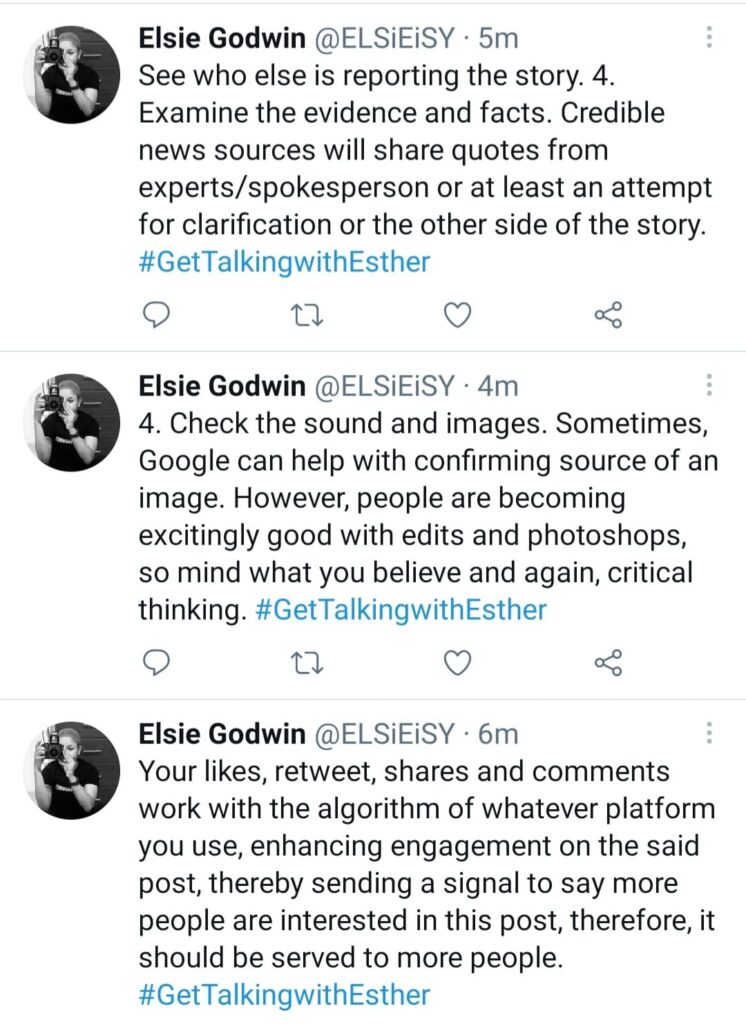
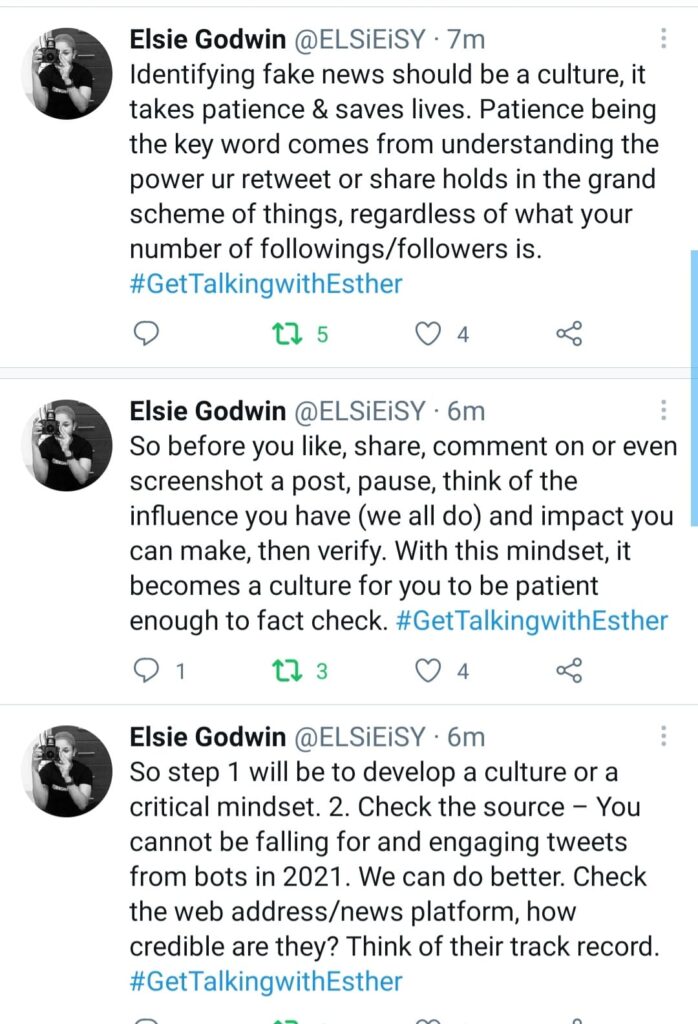
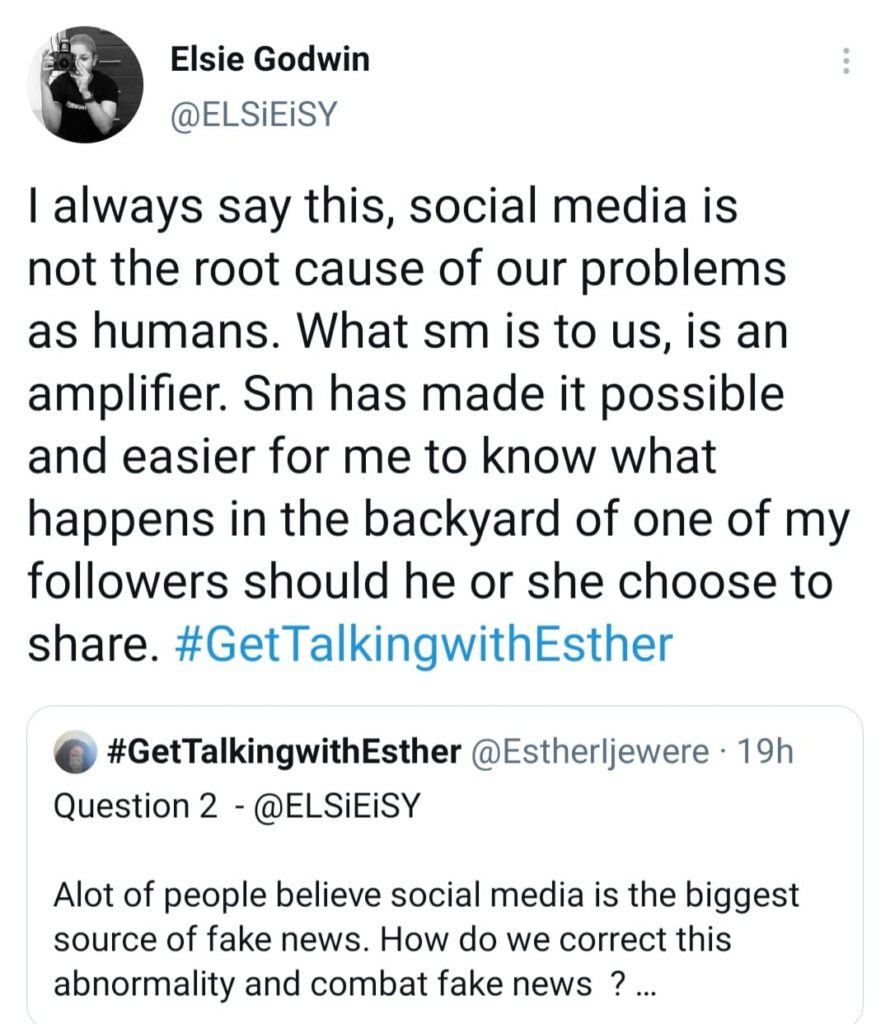




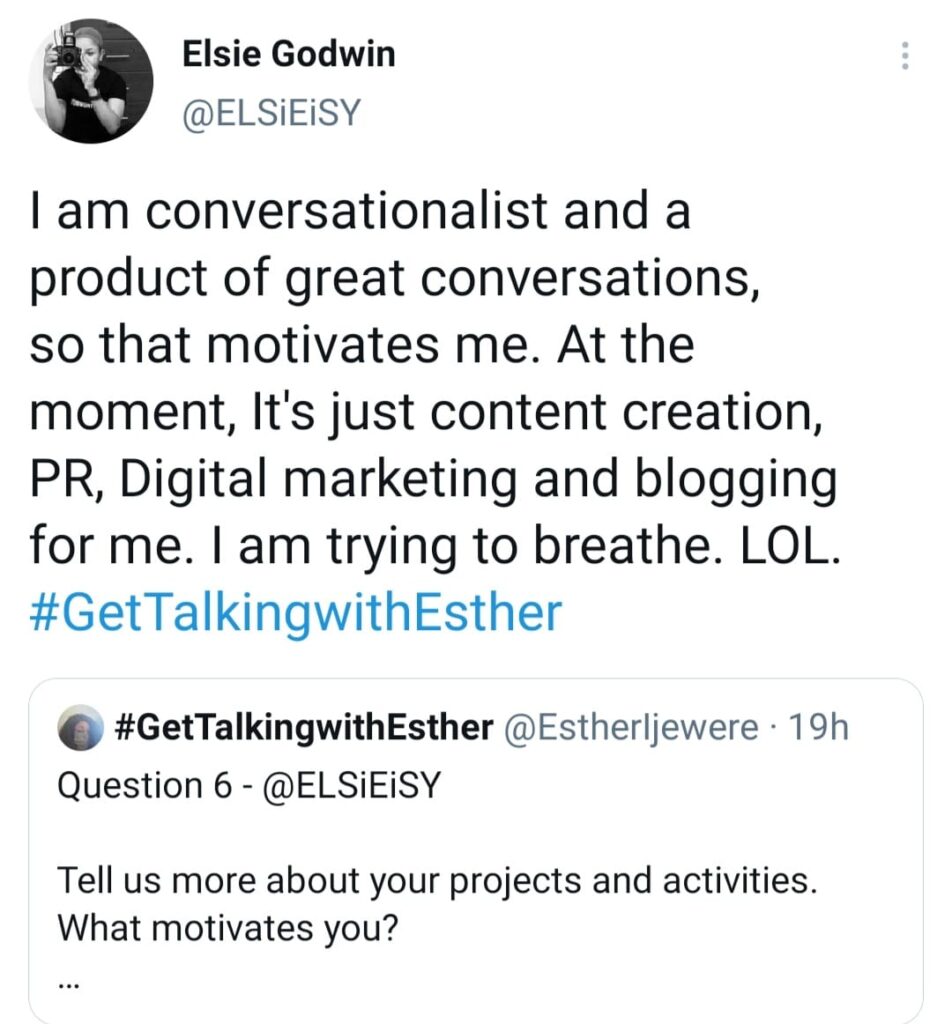
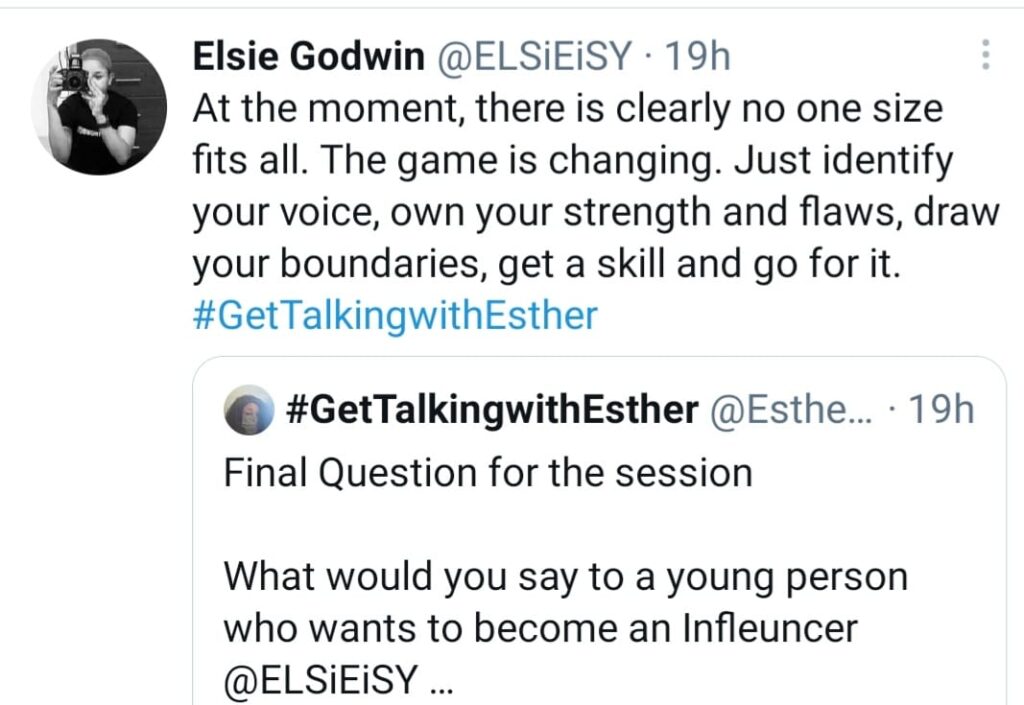
 At the end of the tweet chat , the host asked participants what they learnt from the session, and this is what they have to say;
At the end of the tweet chat , the host asked participants what they learnt from the session, and this is what they have to say;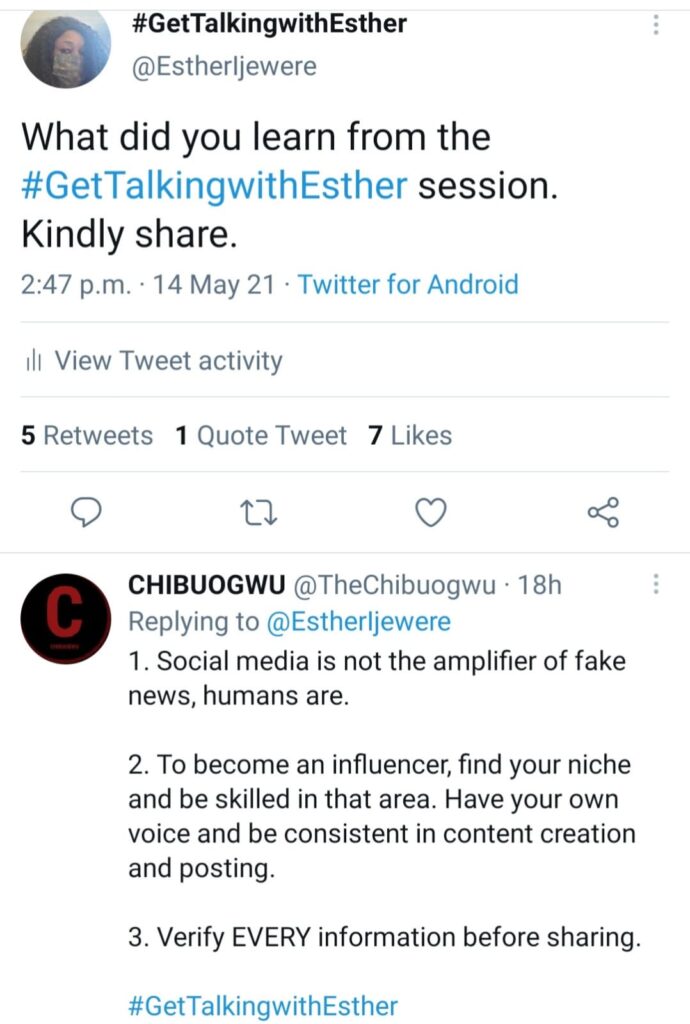
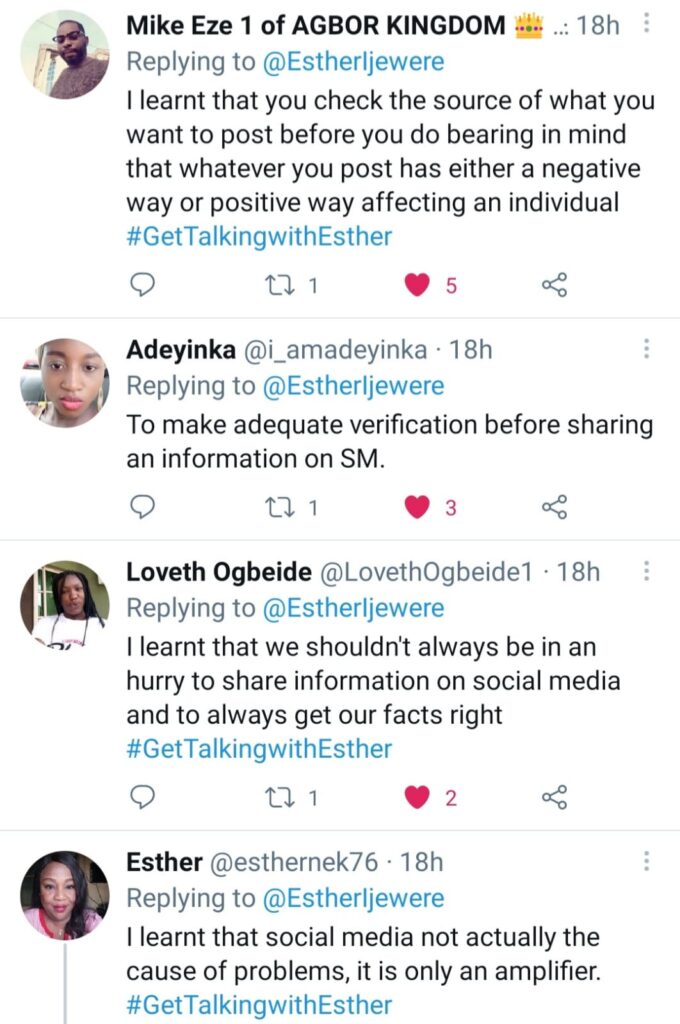
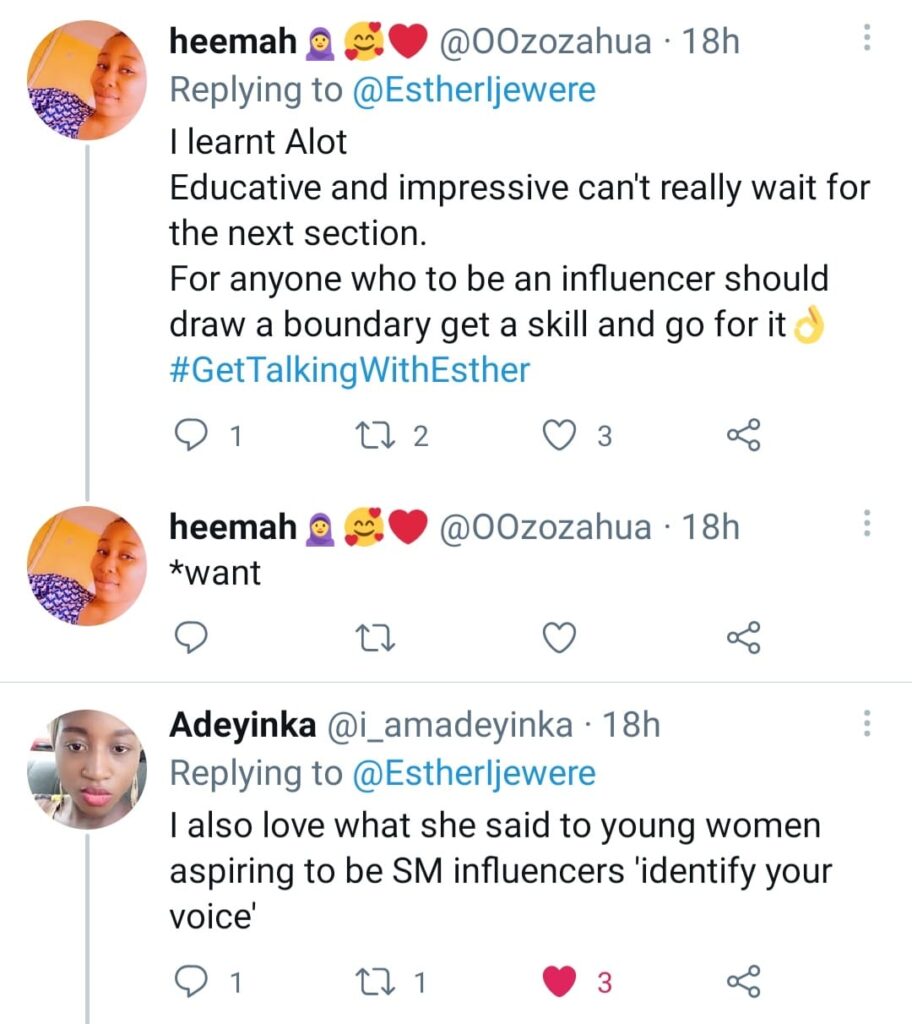 You can see more of the conversation on @estherijewere’s timeline on twitter;
You can see more of the conversation on @estherijewere’s timeline on twitter; 









